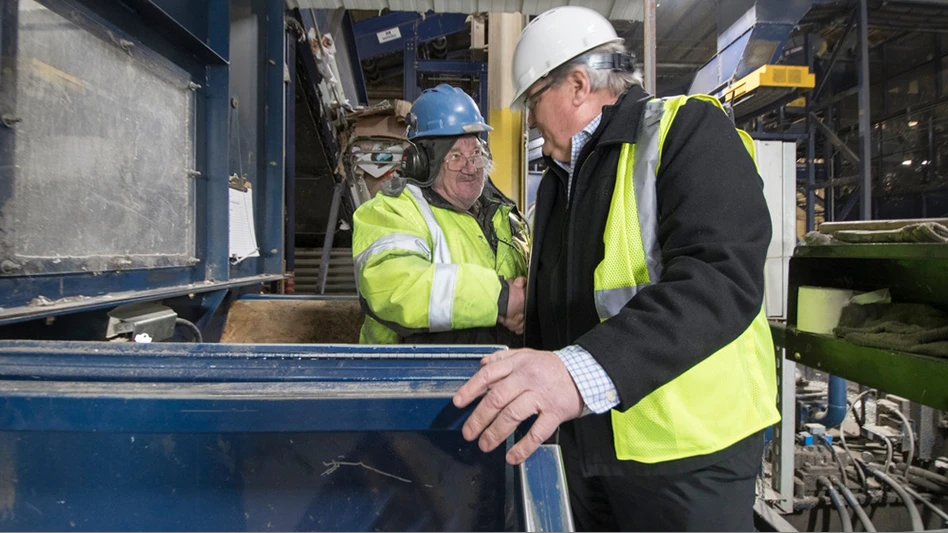
Bojan | stock.adobe.com
The Connecticut Department of Energy and Environmental Protection (DEEP) has announced that $15 million in grant funds is available to Connecticut municipalities, government councils, and regional waste authorities.
The grants are designed to support the development of materials management infrastructure (MMI) at the local and regional levels in response to the solid waste disposal challenges DEEP says many Connecticut municipalities are facing.
In a statement provided to Waste Today, National Waste and Recycling Association (NWRA) President and CEO Michael E. Hoffman says the organization supports the work DEEP is doing to provide grants that will allow municipalities to update or develop waste management infrastructure, however, he points out discrepancies in DEEP's statements regarding the "disposal crisis."
“We are concerned with the use of ‘disposal crisis’ to characterize the current situation in Connecticut," he says. “Municipal solid waste (MSW) is not piling up. In fact, the Connecticut recycling rate at nearly 28 percent is best-in-class in the U.S."
Hoffman says approximately 22.5 percent of the state’s 3.5 million tons of MSW goes to out-of-state, modern, highly-engineered Subtitle-D landfills, and just under 10 percent is composted. He adds that the rest is incinerated in the state at privately owned and operated waste-to-energy facilities, while nearly 40 percent of the nation’s solid waste crosses at least one state line daily to access postcollection options.
"Connecticut residents should be proud of the state’s best-in-class MSW management plan and aware that they do not face a disposal crisis," Hoffman says.
The MMI grant program will provide funds to municipal and regional entities to develop small- and medium-scale waste management infrastructure either in their entirety or as a component to facilitate the development of larger projects.
RELATED: Inflation Reduction Act grant prompts landfill solar projects in Ohio
Eligible proposals will support waste reduction and/or diversion to improve the diversion of MSW and regain self-sufficiency in managing MSW disposal within Connecticut’s borders.
“This is one of the largest investments the state has made to date in local and regional waste management infrastructure,” DEEP Commissioner Katie Dykes says. “DEEP is eager to put these dollars to work as municipalities and regional entities implement programs to improve greater system reliability, environmental sustainability, and fiscal predictability.”
MMI grant funds will be available for individuals and groups of municipalities, and Connecticut regional entities (council of governments, regional planning agencies, resource recovery authority, recycling operating committees, or other entities representing Connecticut municipalities). Eligible applicants must submit a completed application document in conformance with the requirements of the RFA, which can be found on the Municipal and Regional Grants and Technical Assistance website.
DEEP staff will review all applications submitted by the deadline of Dec. 6 on a rolling basis, with all grant awards announced by Jan. 17, 2025.
Eligible proposals should include a clear and comprehensive strategy and timeframe for achieving full and efficient utilization of the proposed facility or infrastructure project. Identification of municipalities and their total populations, regions and other entities, to be served by the proposed facility or infrastructure, must be based upon clear, logical, and supportable assumptions or data, preferably with the inclusion of letters of support from target participants. Proposed projects that are part of a regional approach to waste management will be viewed more favorably.
Editor's note: This article was updated Sept. 13 to include comments from NWRA President and CEO Michael E. Hoffman. The article summary also was updated to reflect these changes.
Latest from Waste Today
- Defunct electronics recycling companies ordered to pay $3M for hazardous waste violations in Ohio
- Tacoma, Washington, launches smart camera technology pilot
- Pride Disposal sees efficiency gains with Hydrotex BIO-XPL hydraulic fluid
- Techbros launches AI-integrated electronics processing facility
- Understanding interchange optimization
- Account Updater: Keeping customer credit cards always up-to-date
- Understanding credit card fees
- CDRA names new executive director





